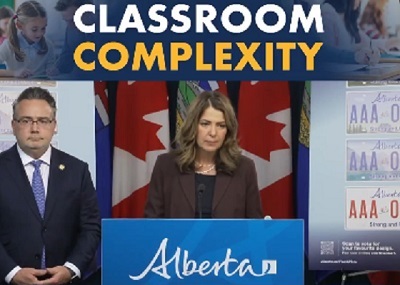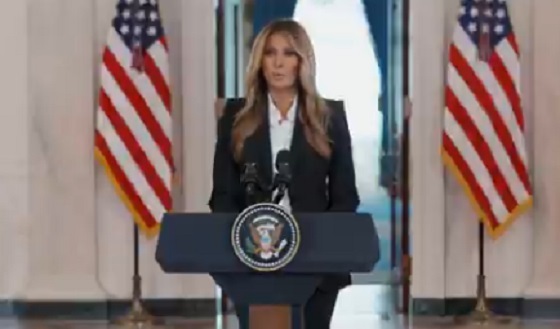Education
Solar eclipse school closures underscore impact of learning loss

From the Fraser Institute
Instead of making every effort to protect instructional time and ensure that schools remain open, students are being sent home for ever more dubious reasons.
Schools are closed out of an “abundance of caution.” No doubt you’ve heard this phrase many times over the last few years. It was commonly used during the pandemic when provincial governments closed schools for months on end—even after it was widely known that COVID-19 posed little risk to most children.
Ontario schools were closed for 135 days during the pandemic, more than any other province. Parents and teachers are still trying to recover from this enormous learning loss. Clearly, this was one situation where an abundance of caution caused more harm than it prevented.
Sadly, it appears that provincial officials and school board administrators haven’t learned from their mistakes. Instead of making every effort to protect instructional time and ensure that schools remain open, students are being sent home for ever more dubious reasons.
For example, school boards across Ontario cancelled classes on April 8, the day of the solar eclipse. Apparently administrators felt there was too great a risk that students might look at the sun during the eclipse and damage their eyes. No doubt more than a few of them glanced at the sun while sitting at home that day. However, there was no need for the school closures to be as total as the eclipse. If they were really that concerned, school officials could have kept students indoors or simply altered the dismissal times.
Initially, the Waterloo Region District School Board (WRDSB) took a common sense approach by stating that schools would remain open and teachers would use the eclipse as a learning opportunity for students. Then, only days before the eclipse, the WRDSB suddenly reversed itself and said their schools would indeed close on April 8, and students would have the opportunity to engage in “asynchronous remote learning” instead.
This decision sent the unfortunate message that WRDSB trustees are incapable of standing up to pressure from people who think that schools must close at the slightest sign of real or presumed danger. As for the notion that remote learning was an adequate substitute, our experience during the pandemic showed that for most parents and students, remote learning was thin gruel indeed.
As a further sign of how far paranoia has crept into the education system, some teacher unions demanded they too should be able to work from home during the eclipse. For example, Jeff Sorensen, president of the Hamilton local teacher union, said, “If it’s not safe for children [to be at school], then it’s not safe for adults.”
The union representing Toronto’s Catholic teachers made a similar request. In a memo to its members, local union president Deborah Karam said the union was “intensifying our efforts” to ensure that teachers be allowed to complete their professional development activities at home that day. Surprisingly, no union leader has yet explained why teachers would be less likely to look at the sun while at home than at school.
Of course, school boards must focus on education while also looking out for the wellbeing of students. But there’s more to student wellbeing than simply shielding them from all perceived risks. Extended school closures cause considerable harm to students because they lead to significant learning loss.
By normalizing the practise of closing schools at the slightest sign of danger, real or perceived, we risk raising a generation of young people who lack the ability to do a proper risk assessment. Life itself comes with risk and if we all took the same approach to driving a car that school boards take to school closures, would never set foot in a vehicle again.
Ontario students had a once-in-a-lifetime opportunity to experience a solar eclipse in an educational environment, guided by their teachers. While some parents no doubt taught their children about the eclipse, many others had to be at work.
By closing schools out of an “abundance of caution,” school boards sent the message that school is not a place where unique educational events can be experienced together. Students should be in school during events such as the eclipse, not sitting at home.
If we’re going to exercise an abundance of caution, let’s be a lot more cautious about the risks of closing schools at the drop of a hat.
Author:
Alberta
Diploma Exams Affected: No school Monday as ATA rejects offer of enhanced mediation

Premier Danielle Smith, Minister of Finance Nate Horner, and Minister of Education Demetrios Nicolaides issued the following statement.
“Yesterday, the Provincial Bargaining and Compensation Office wrote to the Alberta Teachers’ Association (ATA) and formally requested an agreement to enter an enhanced mediation process.
“This process would have ensured that students returned to the classrooms on Monday, and that teachers returned to work.
“Negotiating would have continued with the ATA, Teachers’ Employer Bargaining Association (TEBA) and a third-party mediator to propose a recommended agreement.
“We are very disappointed that the Alberta Teachers’ Association refused this offer. Teachers and students should also be disappointed.
“PBCO made this offer to the ATA because the union has not made a reasonable offer and this strike is impacting students. Alberta’s government is trying to put kids first and bring an end to this strike.
“The offer of enhanced mediation provided a clear path to ending it.
“We want the same things as the ATA: More teachers. More pay for teachers. More educational assistants. And more classrooms.
“This strike has gone on too long and we are extremely concerned about the impact it is having on students.
“We are willing to consider further options to ensure that our next generation gets the world-class education they deserve. After about three weeks, a strike of this nature would reach the threshold of causing irreparable harm to our students’ education.
“The ATA needs to do what is right for its members, and for all Alberta students.
“If it refuses to do so, we will consider further options to bring this strike to an end.”
Diploma exam update
November diploma exams will be optional for students.
With instructional time in schools disrupted due to the teacher strike, the November 2025 diploma exams will now be optional for students. Students who wish to write a diploma exam may request to do so, and their school boards will accommodate the request.
The optional diploma exams apply to all schools provincewide. These exams will still take place on the currently scheduled dates.
Students who choose not to write the November diploma exams can still complete their courses and graduate on time. Their final grade will be based entirely on the school-awarded mark provided by their teacher.
Choosing not to write the November diploma exams will not affect a student’s ability to apply to, be accepted by, or attend post-secondary institutions after graduation.
No changes have been made to the January and June diplomas and provincial achievement tests.
Quick facts
- Students are automatically exempted from writing the November diploma exams but can request to write them.
- School boards must allow the student to write the diploma exam if requested.
Alberta
Premier Smith addresses the most important issue facing Alberta teachers: Classroom Complexity

Premier Danielle Smith is posting this response to a media question about Classroom Complexity.
While Albertans are hearing a lot about capping class sizes, Premier Smith says it might be a much better idea to talk about capping “complexity”.
The challenges teachers face in today’s classrooms are recognized, and work continues toward practical solutions that address their concerns.
Achieving a fair and reasonable agreement that best supports students remains a top priority. pic.twitter.com/o4UCt7sDoU
— Danielle Smith (@ABDanielleSmith) October 16, 2025
-

 International2 days ago
International2 days agoPoland’s president signs new zero income tax law for parents with two children
-

 National2 days ago
National2 days agoPoilievre accuses Canada’s top police force of ‘covering up’ alleged Trudeau crimes
-

 Agriculture5 hours ago
Agriculture5 hours agoIs the CFIA a Rogue Agency or Just Taking Orders from a Rogue Federal Government?
-

 COVID-192 days ago
COVID-192 days agoFreedom Convoy leader Tamara Lich says ‘I am not to leave the house’ while serving sentence
-

 Business1 day ago
Business1 day agoFord’s Whisky War
-

 International2 days ago
International2 days agoAustralian territory bans men from women’s prisons in national first
-

 Red Deer13 hours ago
Red Deer13 hours agoYour last minute election prep: Common Sense Red Deer talks to the candidates
-

 Focal Points1 day ago
Focal Points1 day agoTrump Walks Back His Tomahawk Tease from Zelensky







